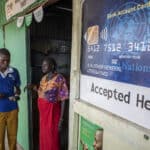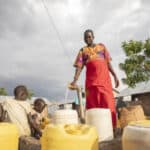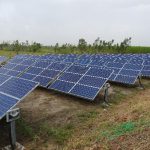In light of AEC Kenya’s 4-year experience and learnings from supporting refugee and host community entrepreneurs in Kenya, and subsequent expansion to Ethiopia in 2021, our advice to other SMEs include:
- Having a clear understanding of the micro, small and medium enterprise dynamics of refugees and hosts before launching programmes, following key guiding questions such as: What type of market is this? For instance, Is it a consumer, producer, services or business to consumer or business to business market?
- Having a clear understanding of the value chain (i.e. what works and what doesn’t work?)
- Leveraging existing business networks, partnerships on the ground and following market trends to inform programming and operations decisions.
- Building trust and setting clear programming expectations.
- Ensuring accountability to deliver on promises.
Finally, we know that every market has its own dynamics and not every advice will be applicable for all contexts. Therefore, AEC Kenya is open to sharing our experiences for specific needs upon request, and we would also be interested to learn best practices from other like-minded SMEs.
With support from KKCF, AEC Kenya foresees the following results:
#1: Skills Improvement – 75% of participants keep frequent records and demonstrate new skills.
#2: Revenue Growth – 75% of businesses increase revenues, minimum US$880K combined growth.
#3: Job Creation – 50% of participants will create jobs, totalling 540 new jobs created.
With KKCF funding, AEC Kenya seeks to have additional market insights, a larger investment portfolio, and double-bottom-line impact to demonstrate to investors the commercial viability of lending to refugees.
Based on our projections, with KKCF funding, 25% of AEC Kenya’s operating costs will be fully sustained with earned revenue by 2024, reaching 60% earned revenue by 2026.
Here below are some challenges we have faced to date:
– In general, weathering the COVID-19 pandemic and the most recent camp closure announcements by Government of Kenya have been the biggest barriers to achieving our milestones as initially planned. However, we see continued recovery and a lessening of restrictions, hence better results compared to the past two years, which creates hope as we carefully watch the trends and pivot accordingly.
– Additionally, some participants who had taken part in other business development programmes with less stringent standards for participation and loan/investment repayments, dropped out of AEC’s cohorts when they learned there would be no immediate financial gain.
AEC Kenya is a subsidiary of African Entrepreneur Collective (AEC), a US non-profit organisation, supporting micro and small businesses, including refugee-owned enterprises, with business development services, access to finance, market linkages and supply chain integration to thriving communities across East Africa.
Since launching in Rwanda in 2012, AEC has supported more than 29,000 refugee/host entrepreneurs across East Africa. Our success in Rwanda demonstrates that when refugee and host entrepreneurs have access to relevant business development services, tools and affordable finance, they will not only live more independently, but they will also contribute significantly to their refugee and host communities.
With over 200,000 refugees across Kakuma Refugee Camp and Kalobeyei Integrated Settlement, and having recognised Kakuma as a marketplace inspired and informed by research, including the 2018 IFC report and AEC scoping visits, we knew that Kakuma/Kalobeyei would be next on our expansion list after proving that our refugee entrepreneurship programme model works in Rwanda.
In 2019, AEC expanded the refugee entrepreneurship programme from Rwanda to Kakuma/Kalobeyei, and since then, we have worked with 3,382 entrepreneurs (58% women) in Kakuma/Kalobeyei; opening up more expansion opportunities to scale our impact across Kenya, including Dadaab Refugee Complex, Mombasa as well as in Ethiopia.
Finally, the KKCF funding opportunity aligns perfectly with our vision for impact and growth in refugee communities, specifically in Kakuma/Kalobeyei, as well as with our proven business model.


